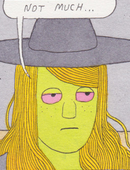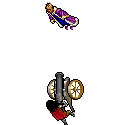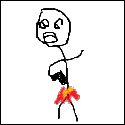|
That's hilarious.
|
|
|
|

|
| # ? May 23, 2024 15:09 |
|
That is really, really funny. How much of the book could have been cut out by a decent editor and been released as a slimmer better book? Would it have been 1/4 of the total word count.
|
|
|
|
All of it. I'm not kidding - when you cut out the tripe, you're left with next to nothing. You can follow some line with the Chandrian, the dragon, the university - except the whole thing doesn't go anywhere. It's even worse with WMF, that doesn't even resemble a coherent plot.
|
|
|
|
|
I think Lamps was a little too heavy-handed in chopping out the attributions, but the "right" way to do it is definitely closer to his version than Rothfuss' where I'm concerned. Visualization and physical attribution are best used to denote shifts in demeanor that would change or develop the tenor of the conversation. You don't need to include constant references to the guy's sharp stare or twinkling glasses, for instance, because the patriarchal, interrogating tone of the conversation seems to be consistent throughout, so ideally you could just include two or three references tops and let the reader's imagination fill in for the rest. Having no attributions at all also bugs me because it makes dialogue sound like two breathless monologues delivered apart from one another - the interjections can be useful for chopping up larger blocks of dialogue into discrete thoughts that makes them easier to follow - but that's mostly a stylistic preference. It also requires that the interjections be short, so that the eye doesn't stumble on them when skipping from end-quote to start-quote. Rothfuss takes a hearty drat sentence to describe a smile, that's not the way.
|
|
|
|
Do you guys think the series would have been better served as a series of small short stories, maybe a few chapters long each, told by Kote to Chronicler with more present day interactions and more nods to "jumping around" because the known bits of the story are close to factual? That way we get it broken into sections instead of it trying to piece together all these different parts?
|
|
|
|
Solice Kirsk posted:Do you guys think the series would have been better served as a series of small short stories, maybe a few chapters long each, told by Kote to Chronicler with more present day interactions and more nods to "jumping around" because the known bits of the story are close to factual? That way we get it broken into sections instead of it trying to piece together all these different parts? You just described Baudolino, kind of. BravestOfTheLamps fucked around with this message at 17:18 on Apr 19, 2016 |
|
|
|
Solice Kirsk posted:Do you guys think the series would have been better served as a series of small short stories, maybe a few chapters long each, told by Kote to Chronicler with more present day interactions and more nods to "jumping around" because the known bits of the story are close to factual? That way we get it broken into sections instead of it trying to piece together all these different parts? I actually like this idea a lot. You could frame it as the Chronicler asking about a particular legend or something. That'd be pretty interesting.
|
|
|
|
Also Invisible Cities by Italo Calvino.
|
|
|
|
Why are some fantasy series so long and bloated? People complain about Moby Dick but: 206,052 words - Moby Dick 259,000 words - Name of the Wind 399,000 words - Wise Man's Fear
|
|
|
|
Ague Proof posted:Why are some fantasy series so long and bloated? People complain about Moby Dick but: Lack of a good editor.
|
|
|
|
Ha, Rothfuss sometimes reads like he is paid by the word as well.
|
|
|
|
Andrast posted:Lack of a good editor. Fantasy's ancestor, the pulp adventure, had a tendency to be shortish because it was often written for magazines or cheap paperbacks. If you look at 1970s sci-fi it tends to be pretty lean, legends like Bradbury are sitting at 45k-70k and a not-insignificant number of their works are magazine fix-ups. You can still sort of see that in fantasy until the 80s or so; Book of the New Sun is essentially one novel but it was published as four 90k word parts over multiple years (and managed to tell a complete story, Pat). I don't think it's a coincidence that the rise of interminable LOTR-esque fantasy series -- the kind that get marketed as a series from the first book -- coincides with works in the genre trending longer and yet not really containing more or better content. It's a bit of a chicken-and-egg concern here because the genre has proven itself able to sustain a market for mediocre poorly-edited bricks of manuscripts as long as the author will continue producing them. Good if you're Sanderson's publisher, bad if you're a Martin or Rothfuss's. But is this because the industry does not waste its time extensively editing such manuscripts before an author proves themselves to be marketable? Is it just not really a concern because they know their customers don't care all that much if the books are really long, and perhaps even prefer them that way (in which case "paid by the word," while not accurate, has a certain ring of truth for the industry)? Yet you have the example of J.K. Rowling's Harry Potter books getting noticeably longer as the series went on, which suggests that rather than getting more attention from editors Rowling might've started getting less (or the editors were less aggressive) once her works became extremely popular. Maybe the only people writing short fantasy are people like Joe Abercrombie who just seem more inclined to writing shorter fiction. There have certainly been authors who are just naturally that way: Hemingway was, Faulkner wasn't, and better editing wouldn't have made the one's works longer or the other shorter. I can consider another possibility: For all I know, maybe good editors don't even work in SF/F if they can help it, so books like this were given editorial scrutiny but due to their length and poor editorial skill were passed along in their present state. From an outsider's perspective I can't imagine why I'd want to edit one 450k word fantasy wordpile when I could edit three or four "respectable" novels of 120k words or less each. On the other hand, if I'm a publisher I don't know why I wouldn't look for really good editors to help build and establish the hype train of hot new names in the genre by making their following works as good as possible, so I can't really explain how Wise Man's Fear happened. It makes no intuitive sense to dedicate fewer resources to your proven authors, unless said authors reject the help because they think they're hot poo poo and you allow them to get away with it. Or you're not capable of helping.
|
|
|
|
BravestOfTheLamps posted:Please point to the well-written parts Kote's fight with the two solders in the Waystone Inn, and the entirety of the last chapter of The Wise Man's Fear, "Elderberry." I would consider these well-written.
|
|
|
|
Bast's anime moment wasn't really impressive.
|
|
|
|
I think a good critique opportunity, Lamps, if you're up for it, I asked thoughtfully, is the story elements added into NOTW later in its 'development cycle.' Such as: Devi, Ambrose being more hands off (if you think he's a Malfoy now, imagine how he was before!), All of the interludes, and the entirety of the draccus section. I'm sure there's more. Possibly Auri? Originally the book simply ended at the university. It's reasonable to assume that the original story arc was to show Kvothe meeting a wizard on the road, then finding his way to wizard school. In earlier drafts, the Chandrian was simply a mysterious group that appeared and killed Kvothe's parents. Rothfuss had to add the later chapters 10+ years later to give the story the feeling of 'coming full circle.' I've talked to other people who love Name of the Wind, but didn't care for the Draccus section whatsoever. You could also look at how the framing narrative acts as a justification for the inherent flaws in the chronicle itself. Bad pacing? It's Kvothe's story! Time moves too quickly? Kvothe's story. Characterization flaws? Kvothe's story--and wait for the third book.
|
|
|
|
Andrast posted:Lack of a good editor. Rothfuss' editor was Betsy Wollheim from DAW, who's well-respected in the publishing industry.
|
|
|
|
Thoren posted:Rothfuss' editor was Betsy Wollheim from DAW, who's well-respected in the publishing industry. Lack of a writer who listens to his good editor then.
|
|
|
|
Thoren posted:Rothfuss' editor was Betsy Wollheim from DAW, who's well-respected in the publishing industry. Nick Lowe posted:The failure of the old paradigm is simple. There's a curious bias in the vernacular of critical discussion towards the qualities that make a book good. Most of the language traditionally used to describe a book's achievement has to do with its positive qualities: the plot, characterization, style, ideas, significance. Moreover, it's a bias that carries over into all those gruesome handbooks on How To Write Totally Brilliant Novels and Win Big Cash Literary Prizes. The reason nobody's yet become a big time novelist by reading up on Diane Doubtfire is just that all the advice in such booklets is directed towards getting you to write a book full of plot, characterization, style, ideas, significance. In short, a good book. Betsy Wollheim is a hugely successful editor.
|
|
|
|
Editing a book to be a literary masterpiece vs. a popular best seller are two wildly different things. No one is denying that Patrick Rothfuss is popular and successful. Several/Many people are denying that Rothfuss is producing anything of literary value.
|
|
|
|
Andrast posted:Lack of a writer who listens to his good editor then. Unless they're just paying the editor too well to keep slogging away at a work an author keeps trying to reject changes to. Or if they have some kind of data that shows editing works extensively doesn't really matter to sales; it just needs to be "good enough," whatever their market research has determined that to be, and if it takes 2 editorial passes on average to get there they take the third draft in whatever state it ends up.
|
|
|
|
Thoren posted:I think a good critique opportunity, Lamps, if you're up for it, I asked thoughtfully, is the story elements added into NOTW later in its 'development cycle.' I don't know what more I can say than that the book is a mess.
|
|
|
|
FFS https://www.kickstarter.com/projects/cheapassgames/tak-a-beautiful-game?ref=thanks_tweet
|
|
|
|
Not to derail, but has anyone tackled the issue that in the story we are dealing with a universal omniscient narrator in the framework story and a first person narrative in Kvothe’s chronicle yet? This does not seem problematic on the surface, but you have to keep in mind that the implicit trust awarded the omniscient narrator of the frame story is tacitly being given to Kvothe and his tale as well. There has been no evidence provided by the frame narrator that Kvothe is telling anything less than his version of the literal truth. If Rothfuss was going to make Kvothe an unreliable narrator for his own tale, the omniscient narrator would have to have given the audience a hint as to the deception already. For example, Rothfuss plays with the universal omniscience a little by having Kvothe attempt some type of magic and fail to produce a result at the tavern early in the framework narrative, but this does not mean Kvothe would be incapable of doing what he claims to have done in the past. Quite simply, an inability to perform magic in his present does not preclude his ability to do so in the past by any information that has been given in the text thus far. Much like having a missing limb in the present does not mean you have always been without the limb. Consequently, Kvothe’s ability to perform magic at the tavern is perfectly in-line with the myths and stories presented in the text. As a result, there is no dramatic irony in the framework as nothing the audience knows in the present contrasts the version of the past that has been given in the chronicle. Without the dramatic irony to explicitly contrast the audience of the framework story from the audience of chronicle story, the implication is that each story holds an equal amount of objective truth. Now, of course, Rothfuss could try to undermine the implication of truth by having a grand reveal that Kvothe (or should I say Kote?) has been lying all along, but as the audience has been given no evidence of that thus far, it would be a cheap plot twist. Like a good mystery story should give you evidence of who the killer is in the text before the reveal, a good unreliable narrator story should give you reasons in the text to doubt the story you are reading. There have been no moments of doubt provided yet. Contrast this with Chaucer’s Canterbury Tales where the framework is the Chaucer the character providing, either through speech or through writing, his version of another character’s version of a story. As such, we have no reason to believe any of the stories in the Canterbury Tales are literal truths. In fact, the unreliability of the tales emphasizes the humor or fantastical nature of each tale. Chaucer the author uses the framework to re-emphasizes the tone of the Canterbury Tales and the individual stories within it as well. Rothfuss uses his framework narrative to merely reemphasize the truth of Kvothe’s tale. So I believe part of the issue people have with Rothfuss’s books is that he is using a literary device that readers frequently see used with unreliable narrators or narratives, but there is no reason to believe Kvothe is unreliable. In fact, I highly doubt that Kvothe will be revealed as an unreliable narrator—biased, yes, but not unreliable. Keep in mind that Kvothe’s bias in his stories do not make what he is saying false, it is just his version of truthful events. The question becomes, then, what does the framework narrative do in the novel(s)? It seems reasonable to assume that the framework is there to act as a meditation on myth-building and/or storytelling in general. Moreover, the implicit truth of the framework could be used as an ironic contrast to the lies and falsehoods of mythology or storytelling. The problem, then, is the framework only reinforces the truth of each myth about Kvothe instead of contrasting what is true with what is not. At no point does the audience of Kvothe’s chronicle (Bast and Chronicler thus far) bring up many, if any, contrasting myths about Kvothe. Say, for instance, that the myth of Kvothe’s early teen years could be he studied naming in a faraway land, but the reality is he struggled as a homeless youth in Tarbean. None of Kvothe’s stories undermine the myths about him; they simply re-emphasize that the myth is true and bring to light exactly how the myth is true. The narrative seems a bit one-note then as things are true about Kvothe and there is little to no conversation or discussion about what is untrue or why that truth is important beyond just being true. A story about the dialect of truth and untruth would provide some discourse to the larger narrative for readers to ponder over, but instead what is left is a treatise on how myths can be made to be true. It is not quite unlike the problem with Sanderson’s magic systems. He tells you how they work then shows you how they can be used. But if you are not interested in how they work in the first place, you won’t be interested in what they can do either. For Rothfuss’s narrative, he tells us there are these myths about Kvothe and he shows you how these myths are actually true in a sense. But if you are not terribly interested in Kvothe’s myths to begin with, then you will not be interested in how the myths are made true. The result is that the overall story is weaker or different than what some people expected. Instead of using a framework narrative to explore how myth-building works or what it means to be a living mythological figure, the framework only emphasizes Kvothe’s power and importance; and that can seem a bit hollow narratively to some. Fake edit: I am not saying the books are good or bad; and I’m not saying you should or should not enjoy them. I am merely pointing out that the author does not use the story’s framework device well.
|
|
|
|
Turdis McWordis posted:FFS Nifty. I know tak was loosely inspired by Go, I wonder how much it'll playtime it in practice.
|
|
|
|
Kingkiller the breakfast cereal! Kimgkiller the flamethrower!
|
|
|
|
Popularity resulting in a erosion of editorial control is definitely a thing that exists, and one of the most commonly tossed-around complaints directed at Martin. The first three books in Ice and Fire are pretty focused and tightly plotted for what they are, but it feels like he was pretty much allowed to do whatever from 4 onward, with fairly disappointing results That doesn't explain these books though
|
|
|
|
3DHouseofBeef posted:Fake edit: I am not saying the books are good or bad; and I’m not saying you should or should not enjoy them. I am merely pointing out that the author does not use the story’s framework device well. It feels like he's doing something smart with the framing story even if he really isn't when you examine it. That's the whole trick of these books, really. He can emulate the texture of good stories even if he isn't actually writing one himself, and apparently texture is enough for a lot of people. See also pretty much every example of his prose brought up in this thread
|
|
|
|
|
BravestOfTheLamps posted:Kingkiller the breakfast cereal! Kimgkiller the flamethrower! Personally I'm holding out for the Official Kingkiller Luthier.
|
|
|
|
Kingkiller the currency conversion kit! Spend hours as a Cealdish moneylender, or hyper-talented broke University student, counting your funds in a dozen incompatible numismatics.* *Not actual Gold/Silver
|
|
|
|
Didn't they already make jots?
|
|
|
|
Solice Kirsk posted:Didn't they already make jots? And I think a very very very limited quantity of silver talents. Might have only been one or two.
|
|
|
|
So as scarce as they are in the first book!
|
|
|
|
I can't wait for Lamps to get around to the Felurian. I wonder which will take longer, that or the completion and release of Book 3.
|
|
|
|
"I moved from Like Pad On Still Water to Whispered Grass Through Wind." Basically anytime he made up stupid loving names for unimportant bull poo poo pissed me off. So really anytime he tried to describe sex, magic, fighting.
|
|
|
|
spoiler alert: the name of the wind is Dave, and he's high as gently caress
|
|
|
|
Solice Kirsk posted:"I moved from Like Pad On Still Water to Whispered Grass Through Wind." Robert Jordan did this to describe his sword fighting forms and it was pretty effective.
|
|
|
|
Atlas Hugged posted:Robert Jordan did this to describe his sword fighting forms and it was pretty effective. He at least put vague descriptions in, and the names were a lot more intuitive. Sheathing the Sword owned every time.
|
|
|
|
Going back to Elderberry, the last chapter of Wise Man's Fear, it's a good example of the weaknesses of Rothfuss and modern fantasy in general. The point of the chapter is to make Bast look badass. And when I say 'look', I'm being literal: Rothfuss does his best to visualize how cool and terrifying Bast through a cinematic effect. quote:It began to rain again, a gust of wind spattering heavy drops against Bast’s face. His eyes were dark and intent. There was another gust of wind that made the end of the branch flare a brilliant orange. But these quick "cuts" only works in a visual medium, and not in a realistic novel. This is the exact effect Rothfuss is going for and fails to achieve because he can't take advantage of the strengths of the novel:  (from Takemitsu Zamurai by Issei Eifuku) BravestOfTheLamps fucked around with this message at 12:08 on Apr 20, 2016 |
|
|
|

|
| # ? May 23, 2024 15:09 |
|
3DHouseofBeef posted:Not to derail, but has anyone tackled the issue that in the story we are dealing with a universal omniscient narrator in the framework story and a first person narrative in Kvothe’s chronicle yet? This does not seem problematic on the surface, but you have to keep in mind that the implicit trust awarded the omniscient narrator of the frame story is tacitly being given to Kvothe and his tale as well. There has been no evidence provided by the frame narrator that Kvothe is telling anything less than his version of the literal truth. If Rothfuss was going to make Kvothe an unreliable narrator for his own tale, the omniscient narrator would have to have given the audience a hint as to the deception already. For example, Rothfuss plays with the universal omniscience a little by having Kvothe attempt some type of magic and fail to produce a result at the tavern early in the framework narrative, but this does not mean Kvothe would be incapable of doing what he claims to have done in the past. Quite simply, an inability to perform magic in his present does not preclude his ability to do so in the past by any information that has been given in the text thus far. Much like having a missing limb in the present does not mean you have always been without the limb. Consequently, Kvothe’s ability to perform magic at the tavern is perfectly in-line with the myths and stories presented in the text. As a result, there is no dramatic irony in the framework as nothing the audience knows in the present contrasts the version of the past that has been given in the chronicle. Without the dramatic irony to explicitly contrast the audience of the framework story from the audience of chronicle story, the implication is that each story holds an equal amount of objective truth. You mean like the only witness correcting him in his description of Denna?
|
|
|






























